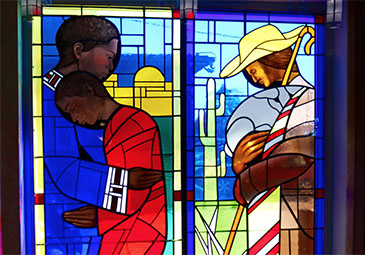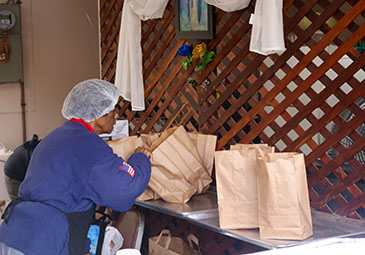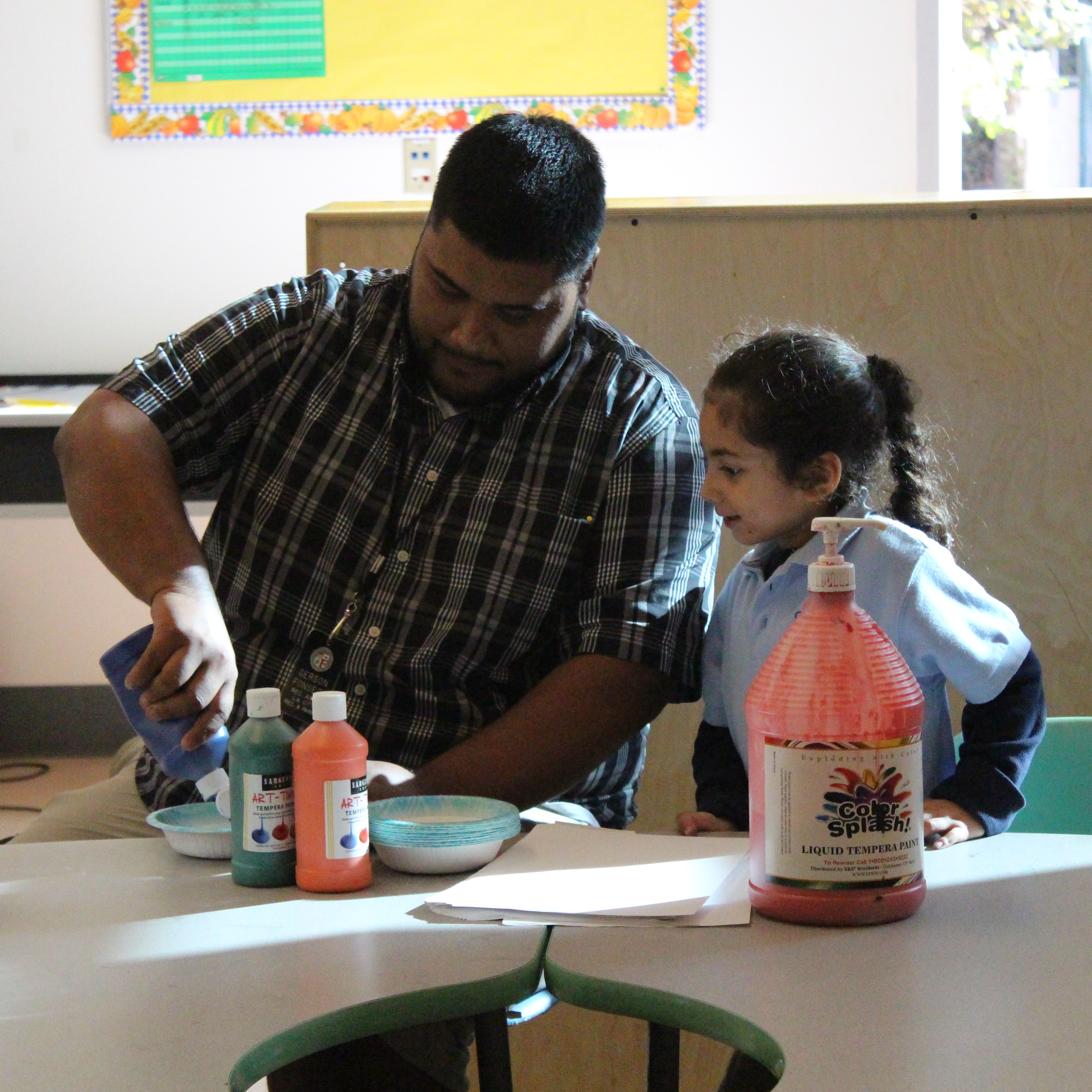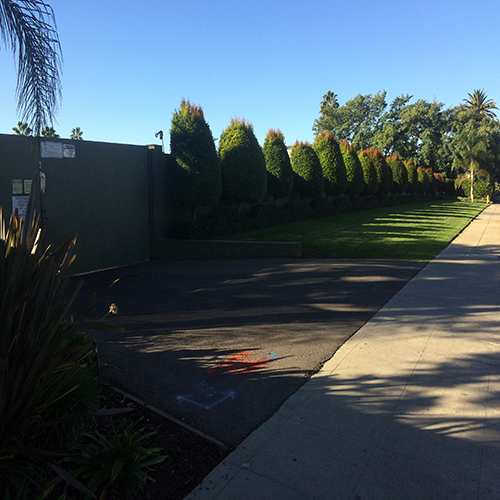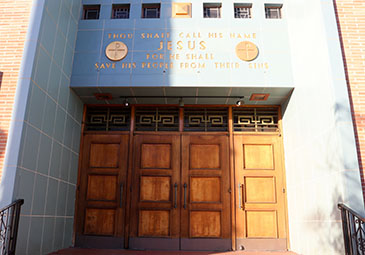
 Photos on the altar honoring African-Americans for Black Catholic History Month.
Photos on the altar honoring African-Americans for Black Catholic History Month. Parishioners find spirituality through diversity and song
As the Creole community moves out of Jefferson Park, more cultures move in. The Holy Name of Jesus Church brings together all ethnicities through the power of prayer and music.
On Sunday mornings, the Holy Name of Jesus Church congregational choir pulls community members through the heavy wooden doors like the Sirens. The stained-glass windows that line the walls of the Catholic church draw the eye through the filled pews of people who descend from around the world. Together, the music and the diversity of the church offers a unique spiritual experience.
The Holy Name of Jesus was founded in the Jefferson Park neighborhood of Los Angeles 95 years ago. Since its opening, the church has adjusted to the changing cultural and ethnic heritage of the community.
“When we first started out, it was very traditional, like a regular Catholic church,” parishioner Sandra Wheeler said. “And then as everyone became more ethnic and found their roots, we created a gospel choir, which is equal to none.”
Wheeler has been a member of the Holy Name of Jesus since she was seven years old – she is now 75 years old. Her and her numerous siblings attended the Holy Name of Jesus School during their elementary years. The school, directly adjacent to the church, still teaches hundreds of students from kindergarten to eighth grade.
Wheeler’s father was a Deacon at the parish before he died just a few years ago. He is remembered by the stained-glass window he donated to the church, which was installed on the right of the altar. Although her parents have died and many of her siblings have moved to different parts of the country, Wheeler is addicted to the contagious joy of the church.
“It’s a home,” Wheeler said. “It’s a church-home is what it is. And this is a family.”
The Hawthorne resident travels about 20 minutes to attend church, but her commute does not compare to the voyage other loyal church-goers have taken. As she reflects on her 68th year as part of the Holy Name of Jesus family, Wheeler believes the biggest difference from day one is the influx of diverse peoples.
“We have a whole community of people from Belize, a community of people from Nigeria, many Hispanics from all over – from Mexico, Guatemala, Nicaragua,” Wheeler said. “We also have a big Japanese community, but it’s more Korean now. Everybody.”
Grace Trejo moved to Los Angeles from Belize just a few years ago. After attending mass at several different churches, she found the community at the Holy Name of Jesus is the strongest. Trejo attends Sunday morning mass religiously.
“I’ve had some of the most exciting Catholic experiences here,” Trejo said of the church. “Some of the celebrations where we experience God through our ethnicity is wonderful.”

Father Stanley, originally from Nigeria, emphasizes the importance of ethnicity in religion. He preaches about acceptance and finding God through cultural experiences. Stanley also encourages parishioners to find salvation by helping the community.
“Some come to the mass and complain about Father Stanley’s thick accent,” parishioner Dolores Ricks said. “But I just sit in the front and listen. He has a lot of good things to preach.”
One of his main initiatives at the church is to help the poor; every day, the church serves breakfast for the homeless and those who struggle to put food on the table so they will always have something to eat. The parish also holds a feast on Thanksgiving Day.
Before moving to Los Angeles, Stanley resided in New Orleans. After years in Louisiana, Stanley found a new home in the Creole dominated Jefferson Park, which made the transition to California easier.
“We have many people from across the world, but even more from Louisiana,” Ricks said. “Definitely a lot from New Orleans.”
Ricks, who also resides in Hawthorne but is originally from Cleveland, Ohio, believes the Creole people were attracted to the church because of the predominately African-American culture. Yet, over the past few years, as some Creole people have moved out of the Jefferson Park area, more Hispanics have moved in. To accommodate the changing culture, the Holy Name of Jesus added a mass at 12:30p.m. on Sundays in addition to two services at 8:00a.m. and at 10:00a.m.; the afternoon mass is held strictly in Spanish.

“In addition to our gospel choir, we added a Hispanic choir,” Wheeler said. “We have music for everyone.”
At the Holy Name of Jesus, music is the heart of worship. The church has a total of five different choir programs including the congregational choir, the gospel choir, the children’s choir, the young adult choir, and the Hispanic choir.
“We love to sing and pray with no reservations or hindrances whatsoever,” Javona Wright said.
Wright has been part of the congregational choir for 25 years. Every Sunday she dresses in an emerald robe and joins about a dozen other parishioners in song.
“The choir means everything to me,” Wright said. “When you sing, you pray twice.”
Prayer in music is a fundamental of the Holy Name of Jesus. And with the growing number of ethnic groups in the parish, Wheeler said, “[the church] embodies the American dream with all the different people living together, working together, worshipping together.”
The history of the Holy Name of Jesus Church
From 1912 to 2016, the parish had a name change, opened a school, and bred several pastors.

